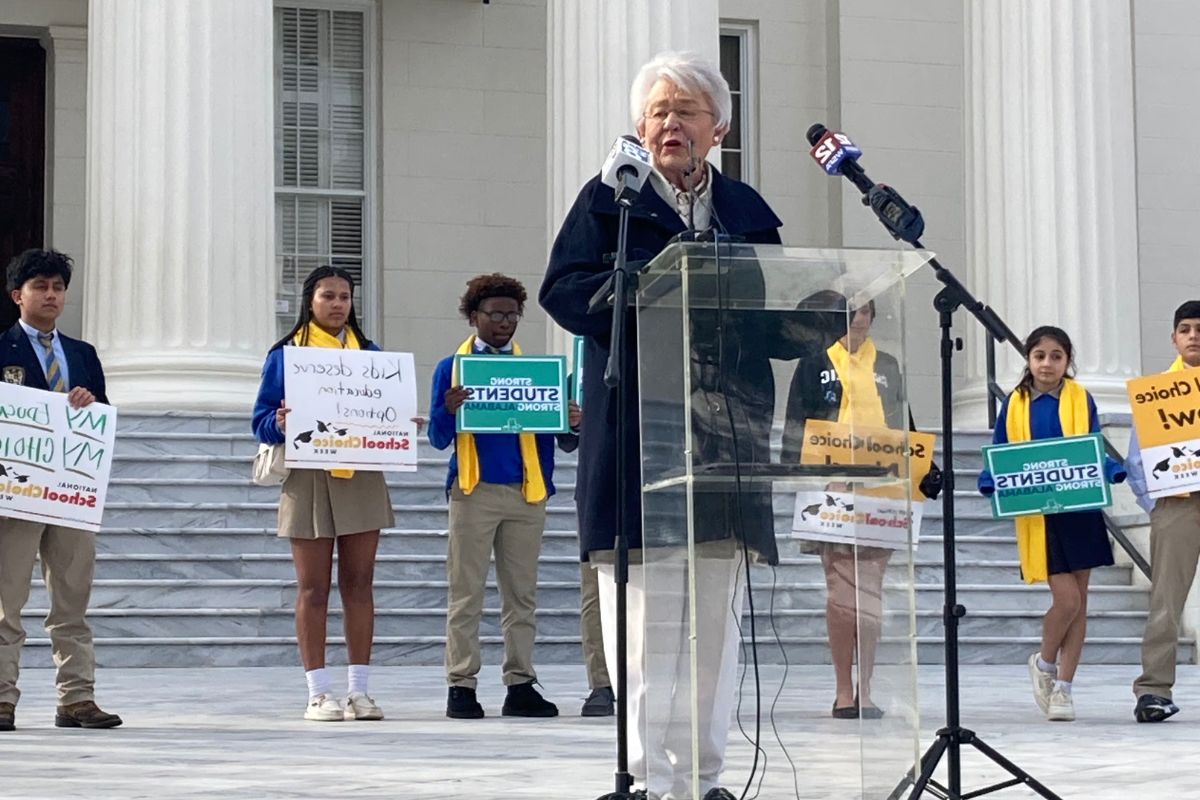Governor Ivey Landmark School Choice Bill: Governor Ivey’s landmark school choice bill has emerged as a focal point in Alabama’s education landscape. This article examines the implications and potential impact of this bill, which aims to introduce Education Savings Accounts (ESAs) in the state.
With Republican Representative Yarbrough spearheading the effort, the bill emphasizes the importance of universality and transparency in providing parents with a range of educational options.
The existing school choice measures, Governor Ivey‘s vision, and the national landscape, offering a comprehensive analysis of this significant development.
Key Takeaways
– Governor Ivey is a strong advocate for education savings accounts in Alabama, aiming to empower parents and provide them with the freedom to choose the best educational options for their children.
– Republican Representative Yarbrough intends to introduce a school choice bill, drawing parallels to last year’s Parental Rights in Children’s Education bill, with the goal of giving parents more control over their children’s education.
– Representative Yarbrough emphasizes the importance of universality and transparency in school choice proposals, believing that every student should have the opportunity to choose the education that suits their needs, and that transparency is crucial in allowing parents and students to make informed decisions.
– Alabama already has existing school choice measures in place, including the Alabama Accountability Act, scholarships for private school attendance, charter schools, and homeschooling options.
Governor Ivey Champions Education Savings Accounts in Alabama Legislative Agenda
Governor Kay Ivey is a staunch advocate for education savings accounts in Alabama. She has made it her top priority for the upcoming legislative session, demonstrating her commitment to improving educational opportunities for Alabama’s children.
By championing this initiative, Governor Ivey aims to empower parents and provide them with the freedom to choose the best educational options for their children. Education savings accounts would allow parents to utilize a designated portion of state tax dollars to cover expenses such as private school tuition or homeschooling materials. This would provide families with greater flexibility and control over their children’s education.
Governor Ivey believes that education savings accounts will promote competition, foster innovation, and ultimately lead to improved educational outcomes for all Alabama students.
Republican Representative Yarbrough’s Intent to Introduce School Choice Bill
Republican Representative Yarbrough intends to introduce a school choice bill, signaling his commitment to expanding educational options in Alabama. While the specifics of the proposed legislation have not been disclosed, it is expected to draw parallels to last year’s Parental Rights in Children’s Education bill (PRICE Act). The PRICE Act aimed to allocate $6,900 per year for an education savings account, allowing parents to utilize these funds for various educational expenses. By introducing this school choice bill, Representative Yarbrough aims to provide parents with more control over their children’s education, fostering an environment where families can choose the best educational options for their children’s needs. This move aligns with the broader push for educational reform and increased choice in Alabama, as highlighted by Governor Ivey’s landmark school choice bill.

ALSO READ: Alabama Democratic Party Shifts District 2 Debates for Televised Showdown
Yarbrough Emphasizes Universality and Transparency
Yarbrough underscores the importance of universality and transparency in the discussion of school choice. He believes that any effective school choice proposal should be accessible to all students, regardless of their background or circumstances. Universality ensures that every student has the opportunity to choose the education that best suits their needs and aspirations.
Transparency is another crucial aspect highlighted by Yarbrough. He emphasizes the need for public schools to be open and transparent about their curriculum, enabling parents and students to make informed decisions. By providing clear information about the educational programs, teaching methods, and academic standards, transparency ensures that parents can confidently choose the school that aligns with their values and goals.
Yarbrough firmly believes that a genuine school choice bill should prioritize universality and transparency. These principles aim to create a fair and equitable system that empowers parents and students while maintaining the integrity and quality of education.
Existing School Choice Measures in Alabama: The Alabama Accountability Act and Beyond
One existing school choice measure in Alabama is the Alabama Accountability Act, enacted in 2013. This legislation allows for scholarships to be provided for private school attendance, with the funds being sourced from donors who receive state income tax credits. The Alabama Accountability Act aimed to provide more options for students who were attending failing schools by giving them the opportunity to attend private schools that may better meet their educational needs.
In addition to the Alabama Accountability Act, there are other school choice options in Alabama, such as charter schools and homeschooling. These measures provide parents and students with alternative choices in their pursuit of education, allowing them to find the best fit for their individual circumstances and goals.

Governor Ivey’s Vision and National Landscape: A Model for Educational Freedom
Governor Ivey’s unwavering commitment to enhancing school choice options in Alabama positions the state as a national model for educational freedom and sustainability, as evidenced by her landmark school choice bill taking center stage. This vision has several key implications:
– Empowering Parents: By expanding school choice options, Governor Ivey aims to empower parents with the ability to make informed decisions about their child’s education, ensuring that every child has access to quality education.
– Fostering Competition: The emphasis on school choice fosters competition among schools, encouraging them to continually improve and innovate to attract students and meet their needs.
– Promoting Excellence: The focus on educational freedom enables students to access schools that align with their interests, talents, and learning styles, promoting excellence and personalized education.
Governor Ivey’s vision for educational freedom aligns with the national landscape, where many states are exploring and implementing similar school choice initiatives to provide students and parents with greater options and flexibility.
Conclusion Of Governor Ivey Landmark School Choice Bill
Governor Ivey’s school choice bill has garnered significant attention and support in Alabama. The bill aims to establish Education Savings Accounts, providing families with greater flexibility and options for their children’s education.
Republican Representative Yarbrough has also emphasized the importance of universality and transparency in the proposed legislation.
With existing school choice measures in Alabama and Governor Ivey’s vision for educational freedom, the state could serve as a model for empowering families and improving education outcomes.
Our Reader’s Queries
Who was the longest serving governor in the history of Alabama?
George Wallace holds the record as the longest-serving governor, with an impressive tenure of 16 years spanning four terms.
Is governor Ivey married?
Twice married and divorced, Ivey has no children. She first tied the knot with Ben LaRavia while they were both at Auburn University. Ivey is a part of First Baptist Church in Montgomery and in 2019, she received a diagnosis of lung cancer.
How many terms can Alabama governor serve?
Alabama’s top leadership is made up of the governor, lieutenant governor, and executive agencies (referred to as departments in Alabama). The governor can hold office for two back-to-back four-year terms without any term limits, as long as they don’t serve more than two terms in a row.
Who was first governor of Alabama?
Born in Virginia on October 2, 1781, WILLIAM WYATT BIBB became Alabama’s inaugural governor. After earning his medical degree from the University of Pennsylvania in 1801, he practiced medicine in Georgia. Bibb’s political career began in 1803.

